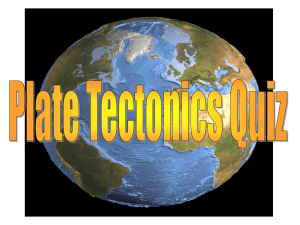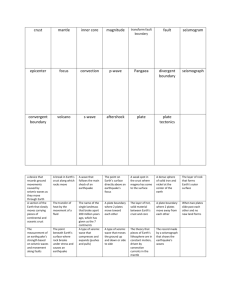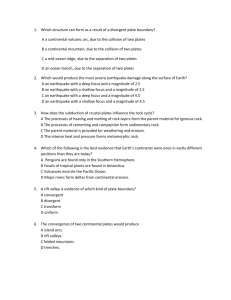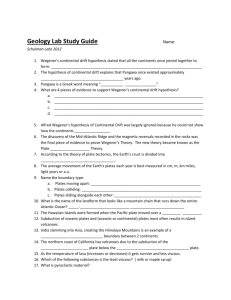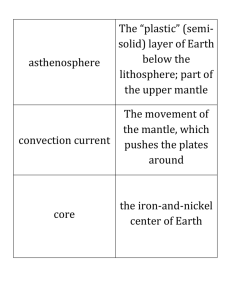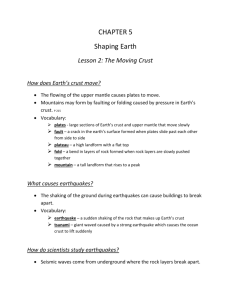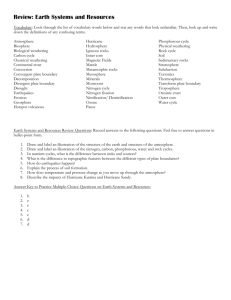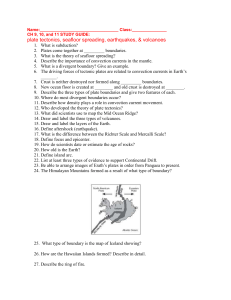EARTHQUAKE BINGO
advertisement
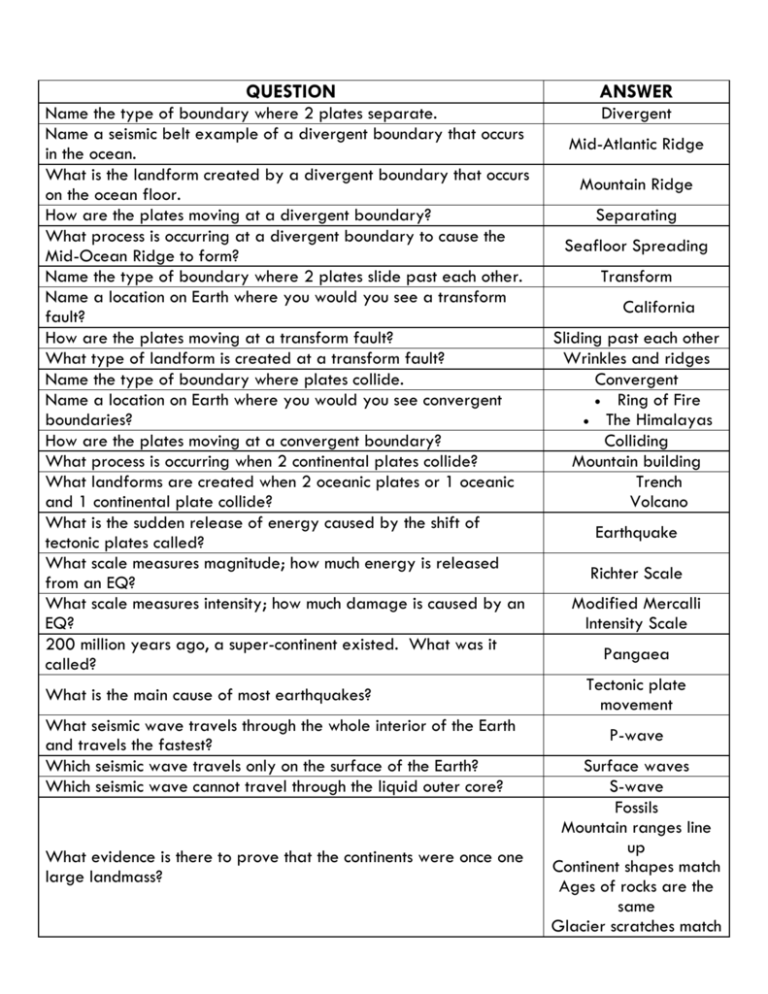
QUESTION ANSWER Name the type of boundary where 2 plates separate. Name a seismic belt example of a divergent boundary that occurs in the ocean. What is the landform created by a divergent boundary that occurs on the ocean floor. How are the plates moving at a divergent boundary? What process is occurring at a divergent boundary to cause the Mid-Ocean Ridge to form? Name the type of boundary where 2 plates slide past each other. Name a location on Earth where you would you see a transform fault? How are the plates moving at a transform fault? What type of landform is created at a transform fault? Name the type of boundary where plates collide. Name a location on Earth where you would you see convergent boundaries? How are the plates moving at a convergent boundary? What process is occurring when 2 continental plates collide? What landforms are created when 2 oceanic plates or 1 oceanic and 1 continental plate collide? What is the sudden release of energy caused by the shift of tectonic plates called? What scale measures magnitude; how much energy is released from an EQ? What scale measures intensity; how much damage is caused by an EQ? 200 million years ago, a super-continent existed. What was it called? Divergent What is the main cause of most earthquakes? What seismic wave travels through the whole interior of the Earth and travels the fastest? Which seismic wave travels only on the surface of the Earth? Which seismic wave cannot travel through the liquid outer core? What evidence is there to prove that the continents were once one large landmass? Mid-Atlantic Ridge Mountain Ridge Separating Seafloor Spreading Transform California Sliding past each other Wrinkles and ridges Convergent Ring of Fire The Himalayas Colliding Mountain building Trench Volcano Earthquake Richter Scale Modified Mercalli Intensity Scale Pangaea Tectonic plate movement P-wave Surface waves S-wave Fossils Mountain ranges line up Continent shapes match Ages of rocks are the same Glacier scratches match up What is the point on the surface of the Earth directly above the EQ that receives the most shaking? What is the name of the location below the surface where the rock or fault slips and energy is released? What is a fracture in the rocks along plate boundaries where the rock breaks and causes an EQ? What is the place where pieces of the broken lithosphere meet? What is the written record made by a seismograph? What is the tool that detects, records, and measures the vibrations produced by an earthquake? What is the measure of the total amount of energy released at the source of the earthquake? What is the measure of the damage done by an earthquake, which is determined by the earthquake’s effect on people, structures, and the natural environment? What is the type of heat transfer scientists believe is happening in the mantle of the Earth? What is the process in which an ocean plate goes under another plate at converging boundaries? What are some effects of earthquakes? The crust and the rigid mantle together form this. Name one of the three major earthquake prone regions or seismic belts. What is the name of the portion of the mantle that has a taffy-like consistency? Which layer of the Earth’s interior is the liquid layer? This type of volcano is flat and broad with fast, runny lava and has gentle eruptions. This type of volcano is usually tall and pointy with thick lava and explosive eruptions! There is alternating eruptions of ash and lava This type of volcano is the smallest of the three with explosive eruptions of ash and cinders. Lava can ooze at the base. This type of rock is formed by small sediments getting pressed and cemented together. This type of rock is formed by changing any type of rock into a Epicenter Focus Fault Plate boundary Seismogram Seismograph Magnitude Intensity Convection Subduction Ruptures (cracks) on the surface Buildings damaged People hurt/lives lost Fires Lithosphere Ring of Fire Mid Atlantic Ridge Mediterranean Himalaya Belt Asthenosphere Outer Core Shield volcano Composite volcano Cinder cone Sedimentary Metamorphic new type of rock through HEAT and PRESSURE This type of rock is formed by cooling lava or magma Igneous
